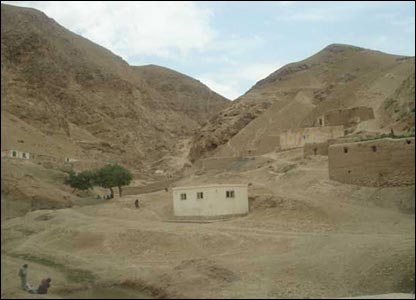Afghanistan: How Peace Was Lost in the North (Foust)
 Joshua Foust concludes in The Atlantic:
Joshua Foust concludes in The Atlantic:
Staunching the north's slide into chaos doesn't require the same investment as it would in the south and east. But the consequences of inaction are just as severe. If we can't at least preserve the local government's sovereignty, then the north's downward slide can only continue, adding a new front in our efforts to bring stability to Afghanistan -- and a new complication for our hopes one day to leave it.
On Friday, a bomb blast at a crowded mosque in Afghanistan's Takhar province killed 20 people, among them Governor Mohammed Omar of neighboring Kunduz province. Far more alarming than the senior official's death is where it happened: both Takhar and Kunduz are in Afghanistan's north, which until very recently had been a haven from the violence marring the rest of the country. Once a place where Westerners could wander the countryside relatively unmolested by terrorism, the Taliban, or homemade bombs, the north of Afghanistan has become very dangerous in just the last two years. With the U.S.- and NATO-led International Security Assistance Force (ISAF) focusing nearly all of its efforts on the south and east of Afghanistan, that inattention has allowed the insurgency to creep into the north and fill the vacuum left by poor security and weak governance. As if this were not enough, the deterioration of the ethnically diverse north reveals that one of the assumptions most central to the effort in Afghanistan is fundamentally and disastrously wrong.
The heartland of this growing instability, or at least one of the heartlands, is Baghlan province. In a country where ethnic politics can dominate political discussions, it is a fairly diverse place: a little more than half Tajik, with a mixture of Pashtuns, Hazaras, Uzbeks, and Tatars making up the rest. It wasn't always perfectly safe--in 2007, for example, a suicide bomber blew himself up at a sugar factory, killing 60 people--but people could generally wander the capital, Pul-i Khumri, without much incident.
Naheed Mustafa, a Canadian freelance journalist, traveled from Kabul to the north as recently as early 2009 without issue. "It was basically safe," she recalls. "Baghlan was safe. We never got the sense that we were going somewhere we shouldn't be."
Over the next year, however, something changed. A distant government in Kabul, beset by corruption, plagued with ethnic resentment --- Tajiks make up most of the provincial leadership, which has largely excluded Pashtuns and Uzbeks --- and struggling with economic stagnation has become deeply unpopular. According to a McClatchy reporter, some local officials blame the U.S.-created local militias, part of General David Petraeus' plan to secure the country with community defense groups, with fostering a sense of insecurity.
In February of this year, the documentary program Frontline traveled to Baghlan, and examined the "Taliban shadow government" there. The militants, linked to non-Taliban groups such as the Islamic Movement of Uzbekistan (IMU) and Hezb-i Islami Gulbuddin (HiG), planted roadside bombs in plain view of an Afghan police station, to almost no reaction from the security forces. Government inattention and a weak security sector meant there was no one to respond to the militants' operations.
Baghlan is not alone. Just to the north is Kunduz, another province whose fortunes have trended downward for the last several years. In 2003, Western troops bragged that Kunduz was the most peaceful province in the entire country. But, as in Baghlan, it didn't last. In August of 2009, the German Bundeswehr, which has responsibility for the province's security, mistakenly bombed a pair of stranded fuel tankers hijacked by militants. The militants quickly abandoned the trucks after they became mired in the banks of a nearby river, and local residents had swarmed the trucks to siphon fuel. Over one hundred people died in what was then the deadliest single civilian incident since the start of the war in 2001. Kunduz Governor Mohammed Omar complained that the Germans are so ineffective at responding to security threats, "It would be better if they left our province." It seems that many in Kunduz would come to share his view....

 Thursday, October 14, 2010 at 11:07
Thursday, October 14, 2010 at 11:07
Reader Comments